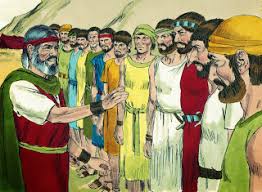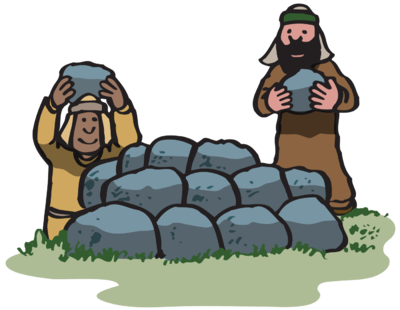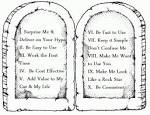Joshua 24:1 – Joshua gathered all the tribes of Israel to Shechem and summoned the elders, the heads, the judges, and the officers of Israel. And they presented themselves before God.

In our last post, we examined a speech that Joshua gave before the elders, leaders and judges of Israel. That meeting was held in Shiloh during one of the occasions where the men of Israel were already gathered there to appear before the Lord (Exodus 23:17).
The gathering described in chapter 24 is clearly a distinct event. This time the entire population is summoned to witness the final address of Joshua. For reasons we will shortly discuss, it was important for the entire nation to present themselves before the Lord one last time before Joshua died.
This great gathering was held in Shechem (also spelled 'Schechem' or 'Sichem'). This location was chosen for a number of reasons.
First, it was close to Joshua's hometown of Timnath-serah. By this time, Joshua is over 100 years old and traveling to Shiloh may have been difficult for him. It was not unreasonable to have the meeting in a place that was convenient for him.
Second, Shechem was a place full of the history of Israel. It was one of the places Abraham settled in as he wandered throughout the Promised Land (Genesis 12:6). It was also the place of his burial (Acts 7:16).
Although the temple was never stationed there, this city had religious significance as well. The very first altar built to the Lord in the Promised Land was erected by Abraham in what would later become Shechem. It was in this same location that the Lord appeared to Abraham and gave him a divine promise regarding the land (Genesis 12:6-7).
Later on, the patriarch Jacob would also settle in this region when he bought a parcel of land directly from Shechem himself. He too, built an altar there to worship the Lord (Genesis 33:18-20).

Yet another altar was built in Shechem by Joshua. This occurred after the children of Israel had crossed the Jordan and defeated Jericho and Ai. At that time, Joshua had the people of Israel travel from their camp at Gilgal to the valley between the mountains of Ebal and Gerizim. Sacrifices and peace offerings were made to the Lord on that altar.
On that occasion, half of the nation of Israel stood in front of Mount Ebal and half in front of Mount Gerizim, with the priests and the Ark of the Covenant in the middle. There, Joshua read the entire law, both blessings and curses, before the people and they committed themselves to following the covenant. He also erected stones and wrote the law upon them. For full details, see our post on Joshua 8:30-35.
Once the land was divided among the tribes of Israel, Shechem became a Levitical city as well as one of the six cities or refuge.
Thus, Shechem truly had national, historical and religious significance for the people of Israel. This made it a fitting/proper venue for Joshua's final address to the nation. It was also an appropriate place for the covenant to once again be renewed by the children of Israel.
Scripture goes on to tell us that in the course of Joshua's address, the people presented themselves before God. Let's consider that statement for a minute.
We know that the presence of God could be found on the mercy seat, between the cherubim on the Ark of the Covenant:
Exodus 25:21-22 - And you shall put the mercy seat on top of the ark; and in the ark you shall put the testimony that I shall give you. And there I will meet with you, and I will commune with you from above the mercy seat, from between the two cherubim that are upon the ark of the testimony, of all things which I will give you in commandment unto the children of Israel.
But the ark itself was not stationed in Shechem; it was at the temple in Shiloh. So how was it possible for the people to present themselves before the Lord at this assembly? There are three widely accepted answers to this question.
One, the priests carried the Ark of the Covenant to Shechem for this meeting. Obviously, there is a precedent for this, because that is what was done when the people stood between Mount Ebal and Mount Gerizim after the victory at Ai.
Two, some scholars believe that once Joshua's speech was concluded, the people traveled to Shiloh and presented themselves to the Lord at that location. As Shiloh is about 10 miles from Shechem, this was also possible.
A third explanation says that since the people were gathered together in a sacred assembly to honor the Lord, he was automatically present with them:
Exodus 20:24 – An altar of earth you shall make for me and sacrifice on it your burnt offerings and your peace offerings, your sheep and your oxen. In every place where I cause my name to be remembered, I will come to you and bless you.
(See also Psalms 82:1). Does this concept seem familiar to you? It should – Jesus promises his followers that where two or three are gathered together in his name, he will be in their midst (Matthew 18:20).
This is an extremely important concept. It means that no matter where Christians gather together (a private home, a restaurant, a park, etc), God honors us with his presence. What a wonderful and comforting thought!
Joshua 24:2 – And Joshua said to all the people, "Thus says the Lord, the God of Israel, 'Long ago, your fathers lived beyond the Euphrates, Terah, the father of Abraham and of Nahor; and they served other gods.'"
Joshua begins his address by saying, 'thus says the Lord, the God of Israel'. In other words, the address he is about to give does not come from his own heart or mind; he is prophetically speaking the words of the Lord to the nation of Israel.
 This means that the commands and warnings given in this address are a direct word from the Lord to his people and they should be taken very seriously.
This means that the commands and warnings given in this address are a direct word from the Lord to his people and they should be taken very seriously.This address can be broken down into three distinct sections. In section one (verses 2-4), God reminds Israel how he had formed/birthed their nation and increased their numbers.
Joshua starts his speech at the very beginning - the formation of the nation through the patriarch Abraham. Abraham was an excellent example to his offspring. He exhibited a high degree of loyalty and trust in God - the very characteristics Joshua is trying to impress upon the current generation.
He reminds the people that when God first called Abraham out from among his people, he was living beyond the Euphrates River (your translation may say 'on the other side of the flood' or 'on the other side of the river') and serving false idols or gods, just like everyone else in his family and nation.
The point Joshua is making here is that the Israelites were no better/no different than other 'heathen' people like the Canaanites. God did not select them as his chosen people based on their own merits or goodness. He chose them in order to display his great mercy and love through them, in spite of their flaws and sins.
Therefore, they had no reason to boast or to think they were better than the nations God had removed before them. The existence of their nation, along with all of their privileges and blessings were due solely to the grace of God and nothing else.
Joshua 24:3-4 – "Then I took your father Abraham from beyond the River and led him through all the land of Canaan, and made his offspring many. I gave him Isaac. And to Isaac I gave Jacob and Esau. And I gave Esau the hill country of Seir to possess, but Jacob and his children went down to Egypt."
Notice that in this verse God says 'I took your father Abraham from beyond the river'. What does he mean by that?
God wants the Israelites to understand that Abraham did not leave his family and country because he was enlightened enough to seek the true God. In fact, the opposite was true - there was nothing in his heart or mind that was searching for God. In other words, Abraham was nothing more than a common sinner/idol worshiper and he would have remained so, if God had not chosen to reveal himself.
I don't know about you, but I feel a real connection to Abraham right now!
If you are a Christian, it is important to understand that God did not choose you as his child because you were morally superior or more holy than other sinners. He didn't save you because your sins were 'smaller' or less significant than the sin of others.
Scripture tells us that all of us have sinned and come short of the glory of God (Romans 3:23). No matter how righteous we thought we were, our righteousness was nothing but a filthy rag in the sight of God (Isaiah 64:6).
We need to keep this in mind as we walk through life. We should never judge someone else, because our sin is just as horrible as their sin. Instead, we should take the time to share the life changing gospel of Christ with them, just as someone did for us. Every sinner can be saved by the blood of Christ, no matter what they have done. Hallelujah!
Furthermore, it was God's omnipotent power and protection which miraculously preserved Abraham as he wandered around Canaan. There were numerous occasions when Abraham and Sara could easily have been slain by the people of Canaan. They were preserved only because God had his hand upon them.

God's divine choices/actions are further revealed as the covenant promises are passed down from generation to generation. Abraham had two sons, Ishmael and Isaac; it was God who chose Isaac as the next heir of the covenant. Likewise, Isaac had twin sons (Jacob and Esau) but it was God who chose to continue his covenant through the lineage of Jacob.
God made both of Abraham's sons into great and vast nations.In his great wisdom he gave Esau the country of Mount Seir, and reserved the land of Canaan for the descendants of Jacob.
However, Jacob's offspring were not yet ready to occupy the land. God sent them into Egypt to prepare and preserve them until the divinely appointed time:
Genesis 15:13 - And he said unto Abram, Know of a surety that your descendants shall be sojourners in a land that is not theirs [Egypt], and shall serve them; and they shall afflict them four hundred years;
When the time of deliverance finally arrived, God sent Moses and Aaron to lead the people out of Egypt:
Joshua 24:5-7 – "And I sent Moses and Aaron, and I plagued Egypt with what I did in the midst of it, and afterward I brought you out. Then, I brought your fathers out of Egypt, and you came to the sea. And the Egyptians pursued your fathers with chariots and horsemen to the Red sea. And when they cried to the Lord, he put darkness between you and the Egyptians and made the sea come upon them and cover them; and your eyes saw what I did in Egypt. And you lived in the wilderness a long time."
The second section of Joshua's address is found in verses 5-7. It focuses on the miraculous exile from Egypt which God performed on behalf of his people.
When we consider Israel's deliverance from Egypt, there can be no doubt that God showed his power and omnipotence time after time. Not only were the plagues themselves miraculous, the timing was too. God announced the plagues in advance. He then manifested and removed them at the exact time he declared that he would. This was an astonishing feat that no false god or idol could possibly duplicate.
By the same infinite power, he led Israel out of Egypt. When Pharaoh pursued them, God once again demonstrated his mighty power by parting the waters of the Red Sea, allowing Israel to cross over on dry land, and then drowning the Egyptians.
Let's stop and ask ourselves this question: What is the significance of this history lesson?
It is a reminder to the people of Israel that they owe everything to God. All that they were, all that they possessed, and all they had accomplished was the direct result of God's mercy and goodness on their behalf. Therefore, it is their reasonable service to faithfully and earnestly serve the Lord at all times and in all things.
This is also true of the New Testament church. The apostle Paul clearly states that in light of the redemption and blessings Christ purchased for us on the cross, it is our reasonable service to present ourselves before God as a living sacrifice:
Romans 12:1 - I beseech you therefore, brethren, by the mercies of God, that you present your bodies a living sacrifice, holy, acceptable unto God, which is your reasonable service.
In other words, we should forsake the idols of this present age (money, sex, entertainment, etc) and live holy lives in the service of our King. We too should faithfully and earnestly serve the Lord at all times and in all things.
Israel's history also demonstrated the utter folly and futility of idolatry. There is no idol or false god that can compete with the Lord Almighty; only the Lord is worthy to be served and worshiped.
It is clear that Israel's history is of the utmost importance! If the Israelites were careful to remember the history of their nation, they would never be tempted to worship the gods of the Canaanites.
Joshua 24:8-10 – "Then I brought you to the land of the Amorites, who lived on the other side of the Jordan. They fought with you, and I gave them into your hand, and you took possession of their land, and I destroyed them before you. Then Balak the son of Zippor, king of Moab, arose and fought against Israel. And he sent and invited Balaam the son of Beor to curse you but I would not listen to Balaam. Indeed, he blessed you. So I delivered you out of his hand."
The third section of Joshua's speech is found in verses 8-12. Verses 8-10 cover the period of history when Israel was marching through the land of the trans-Jordan, on their way to Jericho. This portion of their history includes their battles against Og, Sihon and Balak.
Time does not permit us to review the circumstances of these victories, but if you read them for yourself, you will once again find God's miraculous intervention on behalf of his people.
Joshua 24:11-12 – "And you went over the Jordan and came to Jericho, and the leaders of Jericho fought against you, and also the Amorites, the Perizzites, and the Canaanites, the Hittites, the Girgashites, the Hivites, and the Jebusites. And I gave them into your hand. And I sent the hornet before you, which drove them out before you, the two kings of the Amorites; it was not by your sword or by your bow."
Verses 11-12 described the victories that God granted Israel as the Promised Land was conquered. These were victories that had been witnessed by many of the people present at the speech. The miraculous ways in which God had given them victory testified to his presence during these battles; he was the one who gave them the land. This was evident as we studied the book of Joshua.
Psalm 44:3 - For they [Israel] got not the land in possession by their own sword, neither did their own arm save them: but your right hand, and your arm, and the light of your countenance, because you had favor unto them.
What does Joshua mean when he says that God sent hornets to drive Israel's enemies out before them?

Some commentators believe this should be interpreted literally. In this case, wasps or other stinging insects were sent by God to swarm over the Amorites and render them unable to fight. Either they could not fight because the insects swarmed their eyes, or they were distracted by the stings and could not fight (Exodus23:28, Deuteronomy 7:20).
Other commentators believe the reference to hornets is symbolic. They believe it refers to an uncontrollable terror which God put upon Israel's enemies. Due to this intense terror, they were unable to fight against Israel (Joshua 2:9).
Once again, we must ask this question: Why does the Lord command Joshua to give Israel this history lesson?
The answer is that God wants his people to recognize that their victories did not happen by chance or by the will of man. God was in control; he shaped and molded their nation into what it was as they stood in the valley of Shechem that day.
This was important for them to remember, lest they forsake the Lord and relapse into the same sin (idolatry) which God had delivered Abraham from.
Joshua 24:13 – "I gave you a land on which you had not labored and cities that you had not built, and you dwell in them. You eat the fruit of vineyards and olive orchards that you did not plant."
As we noted in our prior posts, God gave his people blessings that they did not work for.

The farm land was one such blessing. Israel had not plowed, fertilized, sowed or weeded these vast fields, yet they harvested crops from them.
The cities and houses were another enormous blessing from the Lord. Israel inherited fully furnished homes and cities with walls and fortifications already built. The people of Israel lived in safety and at ease, enjoying the fine homes which had been given to them by God.
Ditto for the vineyards and olive groves. Israel did not plant, water, fertilize or prune these vines/trees, however, God allowed them to reap a harvest from them.
These blessings are but a fraction of the good things that God gave to Israel.
Now that Joshua has reviewed all of the good things God had done for the nation, he is going to offer them a choice – would they serve the Lord, or one of the other false gods they were familiar with?
We will examine this choice in our next post.
Let me offer you some encouragement:
Israel's history was important. As the people reviewed it, it became clear that God had been by their side since the nation was formed. He had guaranteed their safety and given them victory over their enemies. He had completely fulfilled all of the promises he made to his people. His grace and mercy were evident in every aspect of their lives.
Why not take a few minutes right now and examine your own history? How old were you when you accepted Christ as your savior? What miraculous things has he done in your life since that time? What prayers has he answered? What has he delivered you from? How has he blessed you?
As you examine your past, it will become clear that God has been by your side, fighting on your behalf all along – and he isn't going anywhere! His love, grace, mercy and miraculous power will be with you all the days of your life.
Let me offer you some relief:
The people of Israel had a wonderful heritage. Their forefathers (and mothers) had served God for hundreds of years and God had blessed them mightily.
What is your family heritage? Do you come from generations of Christians who worshiped and served the Lord? Can you see how God blessed your family mightily?
If so, you can rejoice. You should share your family heritage with your children and grandchildren. Testify to them about the goodness and faithfulness of God to your family.
If you don't have such a heritage, that's okay too. Be honest with your children and grandchildren; tell them about the bondage/sin that Christ delivered you from. Let them know that a new pattern has been established in the family, and it started with you! Pray that God will continue that heritage in the generations to come.
Let me offer you some strength:
If you are in the midst of a battle today, don't despair. The same God who delivered Israel from her enemies also fights on your behalf. God has promised that no weapon of the enemy will prosper against us (Isaiah 54:17).
So remain steadfast during your trial. Continue to worship the Lord, quote his word over your situation and fight off the devil with your shield of faith. The victory will soon be yours, and you will have another testimony of God's faithfulness and goodness to share with future generations.
